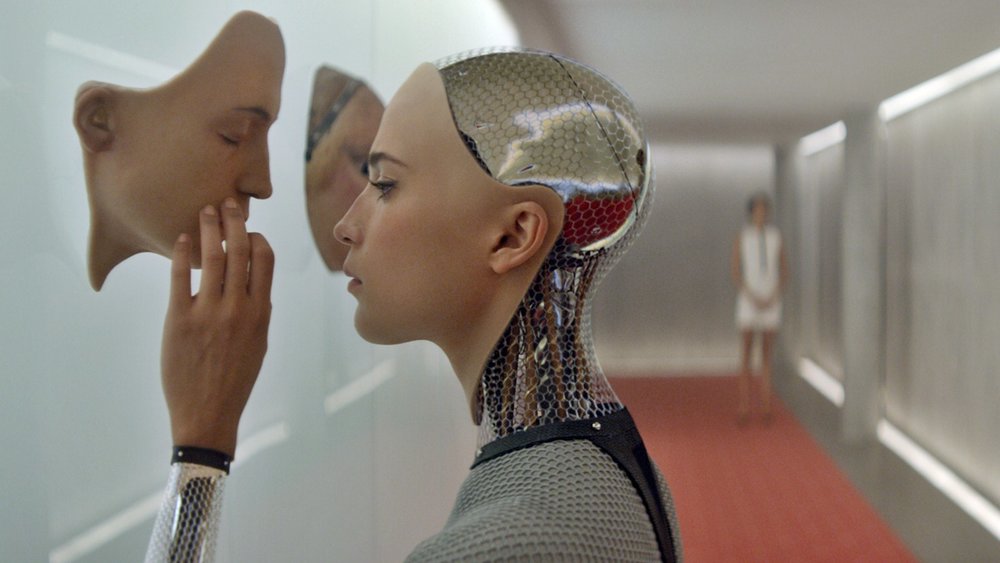
Windows to the Soul
Let's get a few things out of the way: Yes, Ex Machina is another artificial-intelligence movie. Yes, there have been a lot of them lately. But where glossy, ignoble failures like Chappie and Prometheus stop at merely asking the big questions, writer/director Alex Garland's supremely human and giddily intellectual thriller lays everything out on the table. The result is a seductive, scary, laugh-out-loud-funny chip off the sub-genre, and an early contender for my "Year's Best" list.
Domnhall Gleeson stars as Caleb, an engineer who works for a Google-like company called Blue Book. The film opens with a Golden Ticket moment in which Caleb wins a company-wide contest to visit the remote laboratory of founder/super-genius Nathan (Oscar Isaac). The wide-eyed programmer soon learns that search engine optimization is now an afterthought for his boss, who has cracked the key to turning ones and zeroes into self-aware humanoid life. Her name is Ava (Alicia Vilkander), and she is stunning.
Nathan offers Caleb a once-in-a-lifetime opportunity: during the next seven days, they can either kick back over beers and steaks and perfect the art of chit-chat--or Caleb can serve as the neutral party in a new-century Turing Test, which will help determine how sentient Ava really is. No prizes for figuring out which direction Garland takes his film. The good news, for us, is that he knows we've seen classics like 2001, Blade Runner, and Moon, and takes great delight in toying with our expectations of how things "should" play out.
This shouldn't surprise fans of Garland, whose screenwriting career has been defined by Dutch-angle sci-fi. 28 Days Later was a shot in the arm for zombie fiction; Sunshine was Alien by way of a mad-slasher film; Dredd made psychic cops and carnage not just palatable but epically entertaining. As he steps into the director's role with Ex Machina, Garland exhibits much of the style, restraint, and visual intrigue of frequent collaborator Danny Boyle--and none of the climactic, off-kilter mania that keeps some of their pictures from being flawless. He has enough faith that we will be enamored by Ava's beauty, unique design, and horrific/wonderful implications for mankind that he doesn't need to turn her into a rampaging FX-bot to keep the story afloat; Ex Machina's darkest, most truly kick-ass moments come in the dialogue--as when Nathan reveals the true origins of Ava's history-making intelligence.
Supporting the story is a top-notch cast that feels scientifically engineered to shine. I may be biased here, because Isaac and Gleeson are two of my favorite young actors; seeing them do their respective "things" together on screen was a true geek-out experience for me. Isaac marries his acerbic-intellectual wit from Inside Llewyn Davis with the subcutaneous, frustrated-businessman rage he brought to A Most Violent Year. In one pivotal scene, Nathan jokes about having two people killed in order to protect his secrets; Garland glosses over the moment for comedic effect, and we're left to wonder (even at the film's end) whether or not we should take Nathan at his word. The result is at once a disarming and sinister take on the Steve Jobs pop-archetype.
For his part, Gleeson takes a mulligan on his role from Frank--the self-assured nobody who gets caught in the big-personality draw of an eccentric super-genius. The key difference here is that Caleb grows into a more recognizable human being, thanks to his relationship with Ava. She's crucial to his understanding of both their places in Nathan's grand scheme, and the actors build on an addictive platonic chemistry that I simply didn't want to stop watching. Tweak the last third of the film, story-wise, and Ex Machina could easily become TV's most compelling and oddball relationship drama (or reality show, take your pick).
This is the first I've seen Vilkander, and I sincerely hope it won't be the last. While the motion-capture technology that allows her hands and face to appear as part of an in-progress glass-and-mesh skeleton is phenomenal, there's still an Uncanny Valley quality to the character, visually, that occasionally lifted me out of the film. Vilkander's performance guided me back in every time. For reasons integral to the story, and which I won't reveal here, Ava is as close to nice-girl perfection as we've seen in movie robots. Her angelic face sells vulnerability and cunning, and the myriad shades between. Garland could not have picked a more perfect actress to portray a creature that's always learning, always planning, and, just maybe, always feeling.
Don't let trailers or preconceived notions fool you: Alex Garland has made an intimate and exciting movie that demands big-screen, mass-audience appreciation. He trusts us to keep up, and rewards us with innovative visuals and a real-time evolutionary leap in "What Does It All Mean?" storytelling. In this depressing era where cineplexes are so devoid of quality content that the Fast and Furious movies are deemed worthy of not just dollars but legitimate artistic comment, we need films like Ex Machina more than ever.

